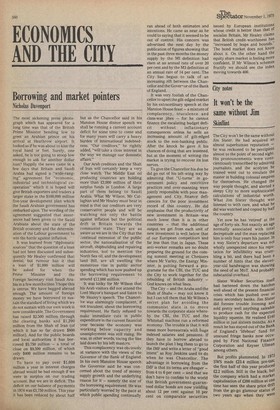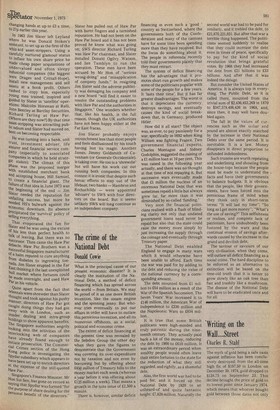City notes
It won't be the same without Jim
Skinflint
The City won't be the same without Jim Slater. He had acquired an almost superhuman reputation he was reckoned to be percipient almost to the point of second sight. His pronouncements were conscientiously transcribed by admiring journalists, and the acolytes he trained went out to emulate the master in building colossal empires for themselves. He changed the way people thought, and alerted a sleepy City to more sophisticated calculations of industrial worth. What Jim Slater thought was listened to with care, and what he did was watched and copied by half the country.
Yet now he has 'retired' at the age of forty-six. Not exactly an age normally associated with total decrepitude and the man replacing him is only four years his junior. In a way Slater's departure was not wholly unexpected since his reputation for infallibility was crumbling a bit, and there had been a number of hints that the elevenyear-old bandwagon was showing the need of an MoT. And probablY substantial overhaul.
Slater Walker Securities itself had battened down the hatches well ahead of the present financial crisis which has pushed over so many secondary banks. Jim Slater did foresee trouble looming and sold pretty well anything saleable to produce cash for the expected liquidity squeeze. He realised £140 million in just sixteen months. As 3 result he has stayed out of the Bank of England's 'lifeboat' fund for unsound fringe banks now occupied by First National Finance Corporation and Keyser Ullman among others.
But profits plummeted. In 1913 SWS made £23.4 million pre-tax; the first half of this year produced £2.2 million. Still in the black, but the company which had a market capitalisation of £200 million at one time has seen the share price drift from the go-go glamour status of two years ago when they were
Changing hands at up to £3 a time, to 2'7p earlier this year.
In 1963 Jim Slater left Leyland Where he was Donald Stokes's assistant, to set up as the first of the whiz-kid asset-strippers. Using a carefully nurtured glamour status to inflate his own share price he made cheap paper acquisitions of undervalued and often sleepy industrial companies (the biggest Were Drages and Crittall-Hope), install new management and sell assets at a book profit. Others rushed to copy him, especially Young men trained, inspired and guided by Slater in 'satellite' operations: Malcolm Horsman at RaIli, John Bentley at Barclay Securities, Richard Tarling at Haw Par. (Where are they now?) By that time asset-stripping was attracting public odium and Slater had moved on, bent on becoming respectable.
He was turning into a bank, unit trust, investment adviser, life assurer and financial service comPany (especially to associated companies in which he held strategic stakes). The climax of this Phase was the proposed merger With established merchant bank and accepting house, Hill Samuel, to create a financial giant. The failure of that idea in June 1973 was the beginning of the end — Jim Slater needed the reputation . for unfailing success, but more he needed HS's bulwark against the economic downturn. Its absence Precipitated the 'survival' policy of selling everything. That evaporated the fun for Slater and he was using the excuse of his less than perfect health to talk of leaving. But there was no successor. Then came the Haw Par debacle. Haw Par Brothers was a successful Singapore manufacturer of a balm reputed to cure anything from diabetes to ingrowing toenails. Jim Slater erupted in the Far East thinking it the last unexploited bull market where fortunes could be made overnight, and used Haw Par as his vehicle.
Quite apart from the fact that °Iientals were shrewder than Slater thought and took against his pushy Manner, directors of Haw Par got caught doing things they had got alAraY with in London, such as insider dealing and intra-group holdings to show apparent benefits. The Singapore authorities angrily looking into the activities of the interlocking web of companies have already found enough to initiate prosecution. The Commercial Crimes section of the Hong Kong police is investigating the SPydar subsidiary which appears to have been set up to enrich directors at the expense of the still-quoted Haw Par.
Singapore's Finance Minister, Mr Hon Sui Sen, has gone on record as saying that Spydar was formed "for the purpose of share dealing for the Personal benefit of the directors." Slater has pulled out of Haw Par with burnt fingers and a tarnished reputation. He had not been on the Haw Par board and it has not been proved he knew what was going on; SWS director Richard Tarling was Haw Par chairman, and Slater installed Donald Ogilvy Watson, and Ian Tamblyn to run the operation. These men have been accused by Mr Hon of "serious wrong-doing" and "misapplication of company funds." In resigning Jim Slater said the adverse publicity was damaging his company and a new board "will find it easier to resolve the outstanding problems with Haw Par and the authorities in Singapore." One wonders whether that, like his health, is the full reason, though the UK authorities have not been happy either at the Far East fracas.
Jim Slater probably enjoys retrenchment less than most people and feels disillusioned by his touch having lost its magic. Another James, Jimmy Goldsmith of Cavenham (or Generale Occidentale), is taking over. He too is a `shrewdie' but will have his work cut out running both companies. In this context it is ironic that despite such heroic efforts to stay out of the lifeboat, two banks — Hambros and Rothschilds — were appointed 'advisers' to SWS with four directors on the board. But it seems unlikely SWS will long continue as an independent company.

































 Previous page
Previous page